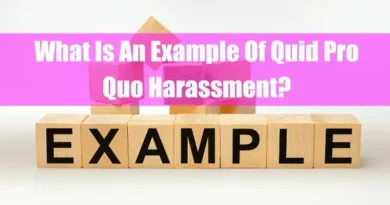Fear and silence in quid pro quo harassment are tightly linked, driven by the power imbalance between harasser and victim. Victims often fear retaliation or negative impacts on their careers or educational opportunities if they refuse the harasser’s demands.
This fear intensifies with the psychological effects of harassment, leading to anxiety, depression, and a sense of powerlessness. The culture within an organization can amplify this silence, particularly in settings lacking supportive policies or clear reporting mechanisms.
Effective legal and organizational measures are vital to breaking this cycle of fear and silence, ensuring victims feel safe to speak out without fearing retribution.
Key Takeaways Table
| Section | Key Takeaways |
|---|---|
| Introduction | – Definition: Quid pro quo harassment involves demands for sexual favors in exchange for workplace benefits, prohibited by Title VII of the Civil Rights Act of 1964. – Fear and Silence: Fear of retaliation and psychological trauma hinder reporting, leading to a toxic work environment. |
| Power Dynamics in Quid Pro Quo Harassment | – Understanding Power Imbalances: Harassers exploit their authority to coerce victims into compliance. – Examples: Workplace – managers promising promotions for sexual favors; Educational – professors offering better grades. – Impact on Victims: Career progression stalls, emotional distress including anxiety and depression. |
| Psychological Impact of Fear and Silence | – Anxiety and Depression: Victims suffer significant psychological distress, impacting their ability to work and interact socially. – Long-term Effects: PTSD, characterized by flashbacks and severe anxiety. – Study: Harvard Business Review reports only 30% of harassment victims make internal complaints. |
| Organizational Culture and Silence | – Culture’s Role: Environments that ignore harassment silence victims. – Leadership’s Role: Effective leadership involves enforcing anti-harassment policies and fostering a safe workplace. |
| Barriers to Reporting Harassment | – Fear of Retaliation: Fear of job loss or demotion prevents reporting. EEOC reports retaliation is the most frequently cited issue in workplace discrimination complaints (55.8% in 2020). – Lack of Trust: Distrust in reporting systems due to mishandled complaints. – Stigma and Social Consequences: Fear of being labeled a troublemaker and social ostracism. |
| Legal and Institutional Responses | – Relevant Laws: Title VII of the Civil Rights Act prohibits quid pro quo harassment. – Mechanisms: Effective policies, multiple reporting avenues, and confidentiality are essential. |
| Support Systems and Resources for Victims | – Counseling and Mental Health Services: Essential for managing psychological effects such as anxiety, depression, and PTSD. – Employee Assistance Programs (EAPs): Provide immediate, confidential support and educate employees about their rights and available resources. |
| Preventive Measures and Solutions | – Anti-Harassment Policies: Clear definitions, reporting procedures, and consequences. – Training and Awareness Programs: Educate employees on recognizing and responding to harassment. – Supportive Environment: Multiple, confidential reporting channels and protection from retaliation. |
Introduction
Definition of Quid Pro Quo Harassment
Quid pro quo harassment is a form of sexual harassment that occurs when an individual in a position of power demands sexual favors in exchange for workplace benefits, such as promotions, raises, or continued employment.
This type of harassment is not just unethical but also illegal under Title VII of the Civil Rights Act of 1964, which prohibits employment discrimination based on sex. The key element of quid pro quo harassment is the implicit or explicit promise of job-related benefits contingent upon submission to sexual advances.
Relevance of Fear and Silence in the Context
Fear and silence are prevalent in quid pro quo harassment cases, significantly affecting the victims’ ability to report the abuse. Victims often fear retaliation, such as job loss or demotion, which can lead to a toxic work environment where harassment goes unreported and unaddressed.
This fear is compounded by the psychological trauma of the harassment itself, making it difficult for victims to come forward. Understanding the dynamics of fear and silence in these situations is crucial for creating effective policies and support systems to protect victims and ensure a safe workplace.
Power Dynamics in Quid Pro Quo Harassment

Understanding Power Imbalances
Power imbalances are at the core of quid pro quo harassment. The harasser typically holds a position of authority over the victim, such as a supervisor or manager, which allows them to influence the victim’s employment status.
This power differential creates a situation where the victim feels compelled to comply with the harasser’s demands out of fear of losing their job or facing other negative consequences. The harasser exploits this power to coerce the victim, knowing that their authority can intimidate the victim into silence.
Examples of Power Abuse in Workplace and Educational Settings
In workplace settings, power abuse can manifest in various forms. For instance, a manager might promise an employee a promotion in exchange for sexual favors or threaten to terminate their employment if they refuse.
Similarly, in educational settings, professors or administrators might offer better grades or recommendations in exchange for sexual compliance. These abuses of power are not only unethical but also violate federal laws designed to protect employees and students from discrimination and harassment.
Impact on Victims’ Career and Personal Life
The impact of quid pro quo harassment on victims can be devastating. Professionally, victims may find their career progression stalled or sabotaged if they refuse to comply with the harasser’s demands. This can result in lost opportunities for advancement, salary increases, and professional development.
Personally, the harassment can lead to severe emotional distress, including anxiety, depression, and a loss of self-esteem. The fear of retaliation and the trauma of the harassment can also spill over into the victims’ personal lives, affecting their relationships and overall well-being.
Psychological Impact of Fear and Silence

Anxiety and Depression Induced by Harassment
Quid pro quo harassment often induces significant psychological distress. Victims may experience anxiety, constantly worrying about potential retaliation or further harassment. This anxiety can be debilitating, affecting their ability to perform their job and interact with colleagues.
Depression is also common among victims, stemming from feelings of helplessness and powerlessness. The constant fear and stress can lead to a persistent state of emotional turmoil, making it difficult for victims to find joy in their personal and professional lives.
Long-term Psychological Effects
The long-term psychological effects of quid pro quo harassment can be severe. Many victims have post-traumatic stress disorder (PTSD), characterized by flashbacks, nightmares, and severe anxiety related to the harassment. This can lead to long-term mental health issues that require professional treatment.
Additionally, the stigma and shame associated with harassment can cause victims to isolate themselves, further exacerbating their mental health problems. The enduring impact of these psychological scars underscores the need for effective support and intervention strategies.
Organizational Culture and Silence

How Organizational Culture Can Silence Victims
Organizational culture plays a crucial role in either fostering or mitigating silence around quid pro quo harassment. In environments where harassment is ignored or trivialized, victims are less likely to report incidents due to fear of not being believed or facing retaliation.
A culture prioritizing productivity over employee well-being can further silence victims, who may feel that their complaints will be dismissed as distractions. Organizations that lack clear policies and procedures for addressing harassment contribute to a culture of silence, where victims feel unsupported and vulnerable.
Role of Management and Leadership
Management and leadership are pivotal in shaping the organizational culture regarding harassment. Leaders who take a strong stance against harassment and actively promote a safe and inclusive workplace can create an environment where victims feel empowered to speak up.
Conversely, leaders who ignore complaints or engage in harassment set a damaging precedent discouraging reporting. Effective leadership involves establishing clear anti-harassment policies and enforcing them consistently and fairly.
Training programs for managers and employees can help create a more supportive environment.
Barriers to Reporting Harassment
Fear of Retaliation and Job Loss

One of the most significant barriers to reporting quid pro quo harassment is the fear of retaliation. Victims often worry that speaking up will lead to job loss, demotion, or other adverse consequences. This fear is not unfounded; numerous cases have shown that victims who report harassment often face some form of retribution.
For example, the Equal Employment Opportunity Commission (EEOC) reports that retaliation is the most frequently cited issue in workplace discrimination complaints, accounting for 55.8% of all charges filed in 2020. The potential for economic hardship, coupled with the emotional strain of confronting the harasser, creates a formidable obstacle to reporting.
Lack of Trust in Reporting Systems
Many victims do not trust the reporting mechanisms in place at their organizations. This distrust can stem from previous experiences where complaints were ignored or mishandled.
In some cases, victims have seen colleagues who reported harassment face negative outcomes, which further erodes confidence in the system. Effective reporting systems must be transparent, impartial, and consistently applied to gain employees’ trust.
According to a Harvard Business Review article, only 30% of employees facing harassment made internal complaints, and less than 15% filed formal legal charges. This low reporting rate is due to fears of retaliation, inflexibility of reporting options, and a hostile work environment where reports may be ignored or lead to backlash.
Stigma and Social Consequences
The stigma associated with being a harassment victim also plays a significant role in the silence surrounding quid pro quo harassment. Victims often fear being labeled as troublemakers or not being believed, which can lead to social ostracism within the workplace.
This stigma can be particularly pronounced in industries or environments where such behavior is normalized or trivialized. The social consequences of reporting harassment can be as damaging as the professional ones, contributing to a pervasive culture of silence.

Legal and Institutional Responses
Overview of Relevant Laws and Regulations
Title VII of the Civil Rights Act of 1964 is the cornerstone of U.S. anti-discrimination law, prohibiting employment discrimination based on race, color, religion, sex, and national origin. Quid pro quo harassment is explicitly addressed under this statute, making it illegal for employers to condition employment benefits on sexual favors.
The Equal Employment Opportunity Commission (EEOC) enforces these laws and provides guidelines for identifying and addressing harassment in the workplace.
Institutional Mechanisms to Address Fear and Silence
Institutions must develop effective mechanisms to address fear and silence in harassment cases. This includes establishing clear anti-harassment policies, providing multiple reporting avenues, and ensuring confidentiality throughout the investigation.
Institutions should also train managers and employees to recognize and respond to harassment. Regularly reviewing and updating policies helps maintain their effectiveness.
The EEOC recommends proactive steps to prevent harassment, such as conducting climate surveys and fostering a culture of accountability.
Support Systems and Resources for Victims

Importance of Counseling and Mental Health Services
Counseling and mental health services are crucial for victims of quid pro quo harassment. These services provide a safe space for victims to process their experiences and receive professional support.
Counseling helps victims manage the psychological effects of harassment, such as anxiety, depression, and PTSD. Access to mental health services is a vital component of an organization’s support system, aiding victims in their recovery and well-being.
Role of Employee Assistance Programs (EAPs)
Employee Assistance Programs (EAPs) are significant in supporting victims of harassment. EAPs offer confidential counseling, referral services, and support for employees facing personal or work-related issues.
These programs provide immediate assistance to victims, helping them navigate the aftermath of harassment. EAPs can also educate employees about their rights and available resources, empowering them to take action against harassment.
According to the U.S. Department of Health and Human Services, EAPs effectively address various issues, including workplace harassment.
Preventive Measures and Solutions
Developing Clear Anti-Harassment Policies
Clear anti-harassment policies are essential for preventing quid pro quo harassment. These policies should define harassment, outline the procedures for reporting and investigating complaints, and specify the consequences for violators. Policies must be communicated to all employees and enforced consistently.
Regular training sessions reinforce these policies and ensure employees understand their rights and responsibilities. The Society for Human Resource Management (SHRM) emphasizes the importance of well-drafted policies accessible to all employees.
Importance of Training and Awareness Programs
Training and awareness programs are critical in preventing harassment and promoting a respectful workplace culture. These programs should educate employees about the different forms of harassment, how to recognize it, and how to respond.
Training should also emphasize the organization’s commitment to a harassment-free workplace and encourage employees to report incidents. Interactive training sessions, including role-playing scenarios, can be particularly effective in helping employees understand and apply the concepts learned.
Creating a Supportive Environment for Reporting
Creating a supportive environment for reporting harassment is vital. This involves building a culture where employees feel safe and supported in coming forward with their complaints. Organizations should provide multiple confidential channels for reporting harassment, such as hotlines, online reporting systems, and designated human resources personnel.
Ensuring that reports are taken seriously and investigated promptly helps build trust in the reporting system. Organizations should also protect employees from retaliation and provide updates on the status of their complaints to maintain transparency.
Conclusion
Addressing fear and silence in quid pro quo harassment requires a multifaceted approach. By understanding the power dynamics at play, recognizing the psychological impact on victims, and fostering a supportive organizational culture, we can create environments where victims feel empowered to speak out.
Legal frameworks and institutional mechanisms must be robust and responsive, providing clear policies, effective reporting systems, and comprehensive support for victims. Preventive measures, including training and awareness programs, are essential to cultivate a culture of respect and accountability.
Ultimately, addressing quid pro quo harassment not only protects individuals but also strengthens the integrity and productivity of organizations.
This comprehensive approach underscores the critical need for vigilance, support, and proactive measures in combating quid pro quo harassment.









